

Along with records broken and medals celebrated, competing at the Olympics is more often littered with narrow defeats, last-gasp errors and mental meltdowns that build true character and sportsmanship.

Furious, aggressive, gentle and elegant all at once — that's the message China's BMX freestyle cyclist Deng Yawen delivered with her history-making golden run at the Paris Olympics.
For those back home who tuned in to watch a sport with no clue what to expect, teen rider Deng dazzled them, no doubt eliciting "oohs "and "aahs" from China's night owls as she lit up the Place de la Concorde under the scorching sun of Paris on Wednesday, performing some of the most spectacular BMX freestyle runs that the world has ever seen in the final of the women's freestyle park event.
With bar spins, high-flying flips, and then the killer trick of double tail-whips — twice — the Chinese favorite, a runner-up in qualifications, literally soared across a course set up with jumps, ramps and rails, exhibiting the best of what bicycle motocross — or BMX — has to offer.
Roared on by the enthusiastic crowd in the iconic Paris square, Deng landed on top of the podium after leading the eight-woman field with a near flawless 92.6-point second run, securing China's first medal of any color in the youthful urban sport that debuted at Tokyo 2020.
It was also China's third Olympic cycling gold across all disciplines overall, following back-to-back titles in the women's track cycling team sprint at Rio 2016 and Tokyo 2020.
The "kingdom of bicycles" has emerged as force on the highest sporting stage, yet Deng took more pride from setting a brave example for China's daring youth — boys and girls — to valiantly try new things.
"I was overjoyed, and only truly felt like an Olympic champion when I sang my national anthem with the Chinese flag raised, during the medal ceremony," said a proud Deng, an 18-year-old native of Southwest China's Sichuan province.
"I am so proud to show the world that I am from China, and I am even happier that I managed to change some opinions about young people, especially girls, that they should not try this or that because of danger, fear or any other perceived obstacles.
"BMX cycling used to be a very niche sport in our country. My gold medal today proves that we can develop a strong program quickly.
"I hope more fans will become interested in BMX, and that more young people will try it to make it more popular," said Deng, who won the World Cup series' Bazhong leg in her home province.
BMX freestyle park involves athletes taking a 60-second run over a rugged park course, performing a variety of tricks. The Olympic final features the top-eight qualifiers and ranks riders by their best run out of two attempts.
Deng set the tone with an impressive 92.5 in her first run, building an early lead in the field. But, she had to deliver under pressure in her second, after runner-up Perris Benegas scored 90.7 points in her second run to close the gap and Deng's teammate, Sun Jiaqi, fell on both of her runs.
Deng rose spectacularly to the occasion, though, holding her nerve to improve her score to 92.6 points on her second attempt, finishing higher than Benegas and bronze medalist Natalya Diehm of Australia.

Courageous decision
Overwhelmed with pride and joy, Deng, in a post-final interview, expressed appreciation for all the support from her coaches and association officials, before she took the opportunity to thank herself for making a bold decision seven years ago.
"Looking back, and regardless of what the future holds, it was definitely the best decision of my life," said Deng, a junior javelin thrower, who chose to join the new Chinese BMX freestyle program in 2017.
"As uncertain and risky as it looked back then, it has paved the way to where I am now, and I really appreciate myself for having the bravery to make the switch, and for all the hard work I've put in along the way," said Deng.
The dramatic shift from throwing a javelin far, to riding a bike high, and having to suffer falls off ramps and walls, was so tough that Deng almost cried every day trying to master some of the world's most difficult tricks.
"Countless falls and bruises here and there have almost been my daily routine. I still have that fear today, like when I pushed for big double tail-whips just now in my second run. That fear factor helps me stay as focused as I need to be, and keeps me sharp throughout the run," said Deng.
The rapid improvement of Chinese women's riders owes a lot to the Venezuelan legend Daniel Dhers, who has been coaching the Chinese national team over the past year.
Known as the "Godfather of BMX", Dhers, as an active athlete himself, has been riding together with his Chinese pupils and passing on his nearly two decades of experience in the sport to China's talented young riders.
With the national program mainly drafting hard-working athletes from other sports since its inception in 2018, Dhers said he had a good start to his tenure after accepting the coaching role, adding that it didn't take long for his lessons on technique, trick selection and the sport's culture to trickle through.
"He really helped us avoid making a lot of mistakes in training with his vast experience. He was instrumental in our technical breakthroughs," Deng said of Dhers' guidance.
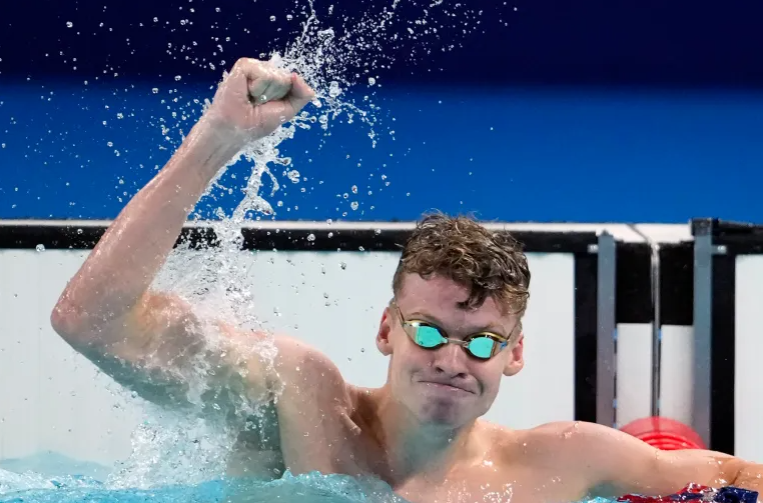
Turns out, those comparisons to Michael Phelps weren't far-fetched at all when it comes to Leon Marchand.
They certainly weren't a burden for the 22-year-old Frenchman.
Marchand completed one of the most audacious doubles in swimming history on Wednesday night, winning the 200-meter butterfly and the 200 breaststroke about two hours apart, in front of a home crowd cheering his every stroke.
Two grueling races. Two very different strokes. Two Olympic records. Two gold medals.
Phelps, who won several doubles of his own while claiming a record eight golds at the 2008 Beijing Olympics, was duly impressed.
"That's probably the greatest double I've ever seen in the history of the sport," Phelps said while appearing on NBC's Olympics coverage in the United States. "The cheer, the electricity... I can't wait to talk to him to hear what it felt like."
"I'm a really shy person," Marchand said. "I was kind of the center of attention during those two races. I was trying to get the energy from the whole crowd. They're amazing to me, pushing me in every final."
The five-time world champion, little known outside the world of swimming before the Olympics, has become a national hero in the space of a week with his trio of golds.
"I've fulfilled a lot of dreams since I've been here. Doing this double was something I felt I could do, but to really do it, that's something else," he said.
"Of course, I had a lot of doubts, because everyone told me it wasn't possible," he said of the unprecedented double.
While the 15,000 crowd at the Paris La Defense Arena belted out a rousing rendition of La Marseillaise during the medal ceremonies, a smiling Marchand looked calm as he soaked up the adulation.
"I'm just trying to keep going. I really enjoyed every moment of those two finals. It was really amazing for me to swim those," he said, after dethroning two defending champions.
Thrilling the French fans and claiming the spotlight, even on a night when Katie Ledecky romped to another gold medal, Marchand notched up his second and third victories in the Paris pool and stamped himself — with the Olympics not even a week old — as one of the faces of the Games.
Trailing most of the way in the 200 fly, Marchand surged past the Hungarian world-record holder and defending Olympic champion Kristof Milak on the final lap to finish with an Olympic record of 1:51.71, touching first by just four-hundredths of a second.
Marchand's final lap was nearly 0.66 faster than anyone else in the field — and 1.26 clear of Milak.
"I've been watching so many races of his," Marchand said. "I know he has a lot of speed, way more than me, so I was just trying to get as close as possible, and then just push it until the end."
The bronze went to Canada's Ilya Kharun.
After rallying to beat Milak in the 200 fly with a finishing kick for the ages, Marchand made it look easy in the 200 breaststroke.
He led all the way, touching in 2 minutes, 5.85 seconds, as the fans — many holding up cardboard cutouts of his smiling face — nearly blew the roof off the arena.
Following on from his dominant victory in the 400 individual medley (IM) on Sunday, Marchand waved one finger and shook his head just a bit, as if he couldn't quite believe what he had done.
Then, he hustled off the deck to another rousing cheer to begin his warm down, before returning for the medal ceremony.
After another boisterous rendition of La Marseillaise, the other two medalists walked slowly around the pool, getting their pictures taken.
Not Marchand. He hustled back to the practice pool. There's still the 200m IM to win.
Agencies
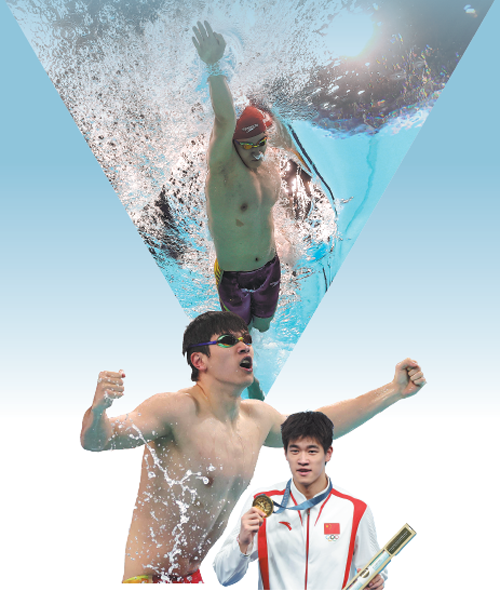
Sure, it's a little early to make such bold proclamations, but freestyle swimmer Pan Zhanle's Paris heroics have immediately thrust his name into conversations about China's sporting immortals.
By breaking the world record in a sprint event long dominated by Western athletes, the teen sensation has left fans marveling at the emergence of a new, waterborne Liu Xiang, after Pan snatched up the coveted gold medal in the 100m freestyle final in the Paris pool on Wednesday, bringing back fond memories of Liu's epic 110m hurdles win at the Athens Games 20 years ago.
The magnificence of Pan's incredible 46.40-second world record swim, which secured Team China's first swimming gold medal in Paris on the fifth day of the Games has, as many claimed, also matched track legend Su Bingtian's feat of making the 100m final at the Tokyo Games three years ago.
The young phenom, who turns 20 on Sunday, took pride in joining his senior track stars as stereotype breakers.
"For myself, I haven't come to terms with it yet," Pan said of the gold medal's significance after the final at the Paris La Defense Arena. "My life goes on, for sure, and I will continue training and swimming."
"But, for Chinese swimming, and for my country, I think it's huge to prove that Chinese athletes can also prevail in another event we were not so good at in the past."
Boasting a strong start and a stunning second-split push, Pan touched first in Wednesday night's final, with a commanding 1.08-second lead over runner-up Kyle Chalmers of Australia. Bronze winner, David Popovici of Romania, finished a mere one hundredth of a second behind Chalmers.
To put that into perspective, Pan did it in what is being called a "slow pool" — built shallower than normal, at 2.15 meters in depth, resulting in more turbulence and bigger waves that athletes and coaches have blamed for slower-than-expected times in Paris.
Pan's new mark for the 100m free was the first swimming world record set at this summer's Games, making him the first male swimmer so far to eclipse a world record in 2024.
Yet, none of this was even imaginable less than three years ago, when Pan made his international debut at the 2021 short-course world championships in Abu Dhabi.
Failing to make the finals in any of the events he contested, Pan had to watch among the spectators, later self-effacingly changing the name of his social media account into "onlooker in the stands".
Since then, though, he's not missed any individual final at any major meet he has entered, nor has he let any opponent take him lightly again.
Overlooked talent
Relatively unknown to the world before Paris, Pan's meteoric rise started at his first long-course meet, the 2022 worlds in Budapest, where, at 17, he tied the Chinese national record set by 2015 world champion Ning Zetao with a sublime semifinal swim of 47.65.
Despite being overshadowed by then world-record holder Popovici, Pan still managed to give the Romanian prodigy a scare by following him shoulder-to-shoulder in the final's first split, before finishing fourth, just 0.21 sec behind the winner.
Following that Budapest launch, Pan fired his boosters, fueled by discipline and hard work supported by science and technology, such as underwater monitoring and analysis in training, which propelled him higher among the elite ranks of the sprint event, further raising expectations that even better results could be on the horizon.
A year later, by the time the world championships in Fukuoka, Japan, rolled around, Pan had started beating Popovici. In the 100m final, Pan maintained his scintillating pace, finishing fourth in a new Asian record time of 47.43, beating the Romanian star by 0.4 sec and placing just one hundredth of a second off the podium.
Powered by Pan, Team China won both men's free relays and the mixed 4x100m free relay. Combined with victory in the women's 4x200m free relay, it was the country's best-ever collective result at the long-course worlds.
A star had been born, but, as he continued his ascent, most eyes were focused on other stars in the swimming firmament.
Pan flew under the international radar until the all-important Olympic year arrived, landing in some style at February's worlds in Doha, where he broke the 100m world record for the first time in a surprising fashion.
Out of blue, in the men's 4x100m relay on Feb 12, Pan wowed the capacity crowd at the Aspire Dome by clocking 46.80 in a strong leadoff leg, shaving 0.06 sec off Popovici's previous record and leaving the on-site commentary team in awe. "We still have a race to complete here", the loudspeaker shouted in disbelief.
Wednesday night in Paris, Pan convinced even his strongest critics in the pool, and made sure that no one is looking elsewhere now.
Popovici, asked by some media how insanely, or perhaps suspiciously, fast Pan's swim looked, said it's all reasonable as long as Pan is working hard in the right direction. "I think we can go even faster.
There are people now alive, and who are swimming, who can do it. It's just a matter of putting it together and doing it at the right moment," said Popovici, who will turn 20 next month.
"This is only motivation for us. I mean, we can't be mad, we can only congratulate him. This is what sports is."
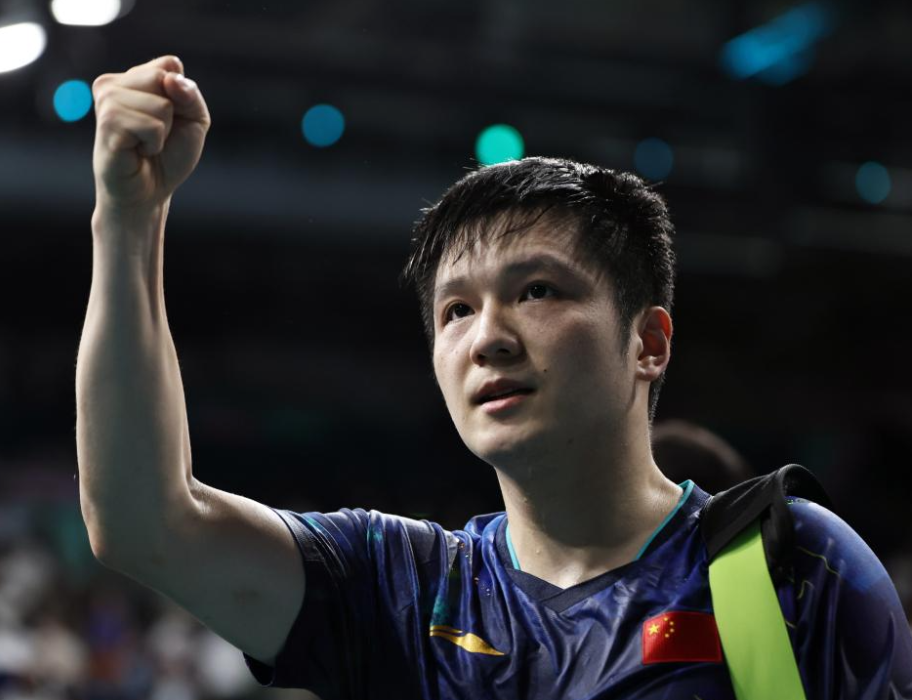
PARIS - China's Fan Zhendong endured a tough contest in the Olympic table tennis men's singles quarterfinals here on Thursday, being beaten in the first two sets before managing a 4-3 comeback win over Tomokazu Harimoto of Japan in a seven-set thriller.
The 21-year-old Japanese started strongly, leading 2-0 and then 3-2, while the second-seeded Chinese fought back fiercely to force a decider. After tying 7-7 in the final set, Fan scored four straight points, wrapping up the match 2-11, 9-11, 11-4, 11-7, 4-11, 11-7, 11-7 at the South Paris Arena 4.
"At the start of the match, I made quite a lot of unforced errors and he played very well. That became two kinds of pressure. He never gave me too many chances," said the 27-year-old Fan, who won the men's team gold and singles silver at Tokyo 2020.
"When I fell behind, I didn't panic. I adjusted my rhythm and slowly found my momentum in the match again. I was very determined," added Fan.
"I left everything out there and did everything that I could have done," said Harimoto, a member of the bronze medal-winning men's team at Tokyo 2020. "In the last two sets you saw the quality that Fan had. He had the slight edge over me."
Fan will next play hosts France's 17-year-old Felix Lebrun on Friday for a spot in the men's singles final.
In the women's part, Sun Yingsha and Chen Meng, the top and second seeds in the women's singles event, both triumphed over their opponents with straight-set victories to reach the semifinals.
Sun, 23-year-old, who took gold in the mixed doubles at Paris 2024 with her partner Wang Chuqin, trounced 32-year-old Cheng I-Ching of Chinese Taipei 11-7, 11-4, 19-17, 11-5.
The third set of the match lasted 23 minutes before Sun secured the win. "To be able to take that third set was very crucial in winning this match," said Sun, who also won the women's team gold and singles silver at Tokyo 2020.
"It was such a tight game. It might look like I won 4-0, but in truth, we both played very well in this match," she added.
Sun will next play 24-year-old Hina Hayata of Japan on Friday in the semifinals. "Now I'm in the semifinals, I have built up some tournament momentum. Hopefully, I'll be able to enjoy the rest of the event and not leave any regrets," said Sun.
Earlier on Thursday, Sun's compatriot Chen Meng rallied to beat 29-year-old Sofia Polcanova from Austria 11-5, 11-3, 11-0, 11-8 to make the semis, where the second seed will face 20-year-old Shin Yu-bin of South Korea.
"I didn't expect the scoreline to be like this. Overall, I adjusted and moved very well on court," said the 30-year-old Chinese as the defending champion.
"When you're in the quarterfinals, no opponent is easy. My opponent is also a great player from Europe," said Chen, adding that "you have to give your all no matter what, and it's only then that you can play well."
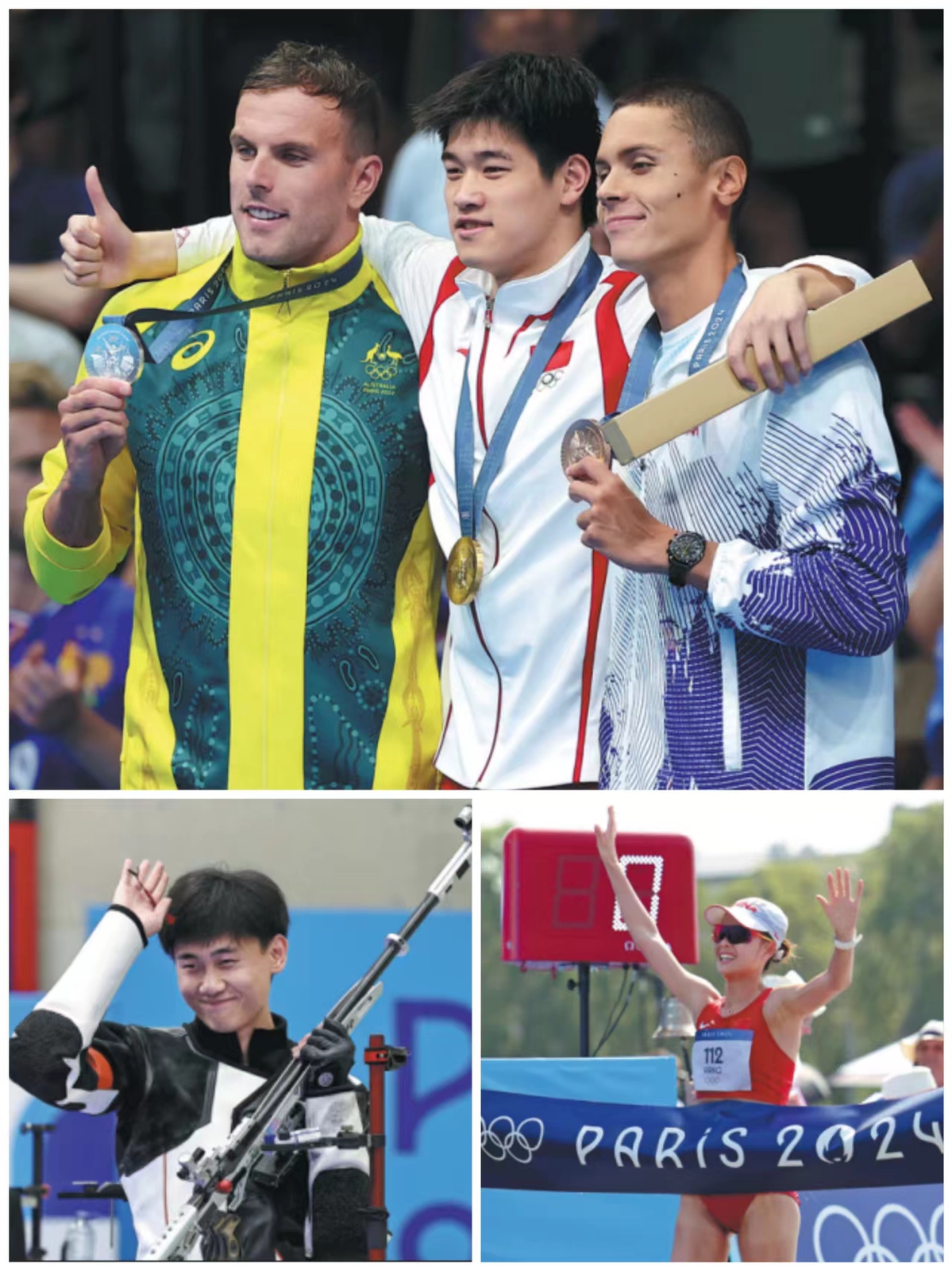
Freestyle swimming prodigy Pan Zhanle reaffirmed the integrity and solid progress of Chinese swimmers by breaking his own world record to win the men's 100-meter freestyle on Wednesday night at the Paris 2024 Olympic Games.
Pan, 19, who cleared several rounds of doping tests, finished in 46.40 seconds to win China's first swimming gold at the ongoing Games in the French capital, topping his 46.80 seconds record made in February at the world championships in Doha, Qatar.
Entering Wednesday's final session under huge pressure to end China's gold medal drought in the Paris Olympics pool, Pan sent the capacity crowd at the La Defense Arena into a frenzy as he shaved 0.4 second off his own record.
It was the first world record broken in any swimming competition by the end of Wednesday, and significantly boosted Team China's morale following a series of near-misses from the top spot on the podium in earlier events.
Pan's masterful performance, which came after he completed rigorous doping test programs prior to and during the Games with zero positive results, delivered a fitting reply to some Western media organizations, such as The New York Times, and other organizations led by the United States Anti-Doping Agency that claimed Chinese swimmers achieved consistent improvements through "unfair" means.
"I just swam perfectly today and made a strong impression for Chinese swimming. I hope this gold lifts the spirits of the whole team and helps more teammates make a golden start," Pan said at a news conference held after the event.
"For Chinese swimming and for my country, I think it's huge to prove that Chinese athletes can also prevail in another event (other than traditionally strong disciplines) in swimming," he added.
Australia's Kyle Chalmers finished 1.08 seconds behind Pan to win silver, while former world record holder David Popovici of Romania finished another 0.01 second behind to settle for bronze.
In response to media allegations before the Paris Games, targeting a food contamination incident involving 23 Chinese swimmers in 2021, the World Anti-Doping Agency, World Aquatics, which is the international body governing six aquatic sports, and the International Testing Agency published relevant review reports and analyses to support the Chinese antidoping authorities' assessment of the case as a no-fault incident.
As a talented young swimmer, who is particularly strong in his final split push, Pan made his presence felt at the world championships in Doha by setting his previous record in a stunning leadoff leg in China's gold-winning men's 4x100m relay.
Asked how he managed to achieve such impressive progress, the teenager attributed his improvement in time during the Olympics to hard work, commitment to clean sport, discipline and the support of modern training methods.
"I took 21 doping tests from May to July, prior to the Games, and had no positive results at all. It was no big deal as long as the testing was conducted fairly and according to rules. I cooperated with all the testing procedures and stayed confident that I am competing fair and clean," Pan said.
"As far as my daily routine is concerned, I did a lot of aerobics and endurance training to strengthen my push and kick in the final split. We have also adopted a scientific underwater monitoring and analyzing system to review our techniques and strokes, so that we can train better and more effectively," he added.
Pan's great form has been hailed by his rivals including Chalmers, the 100m freestyle winner at the 2016 Rio Games, who said the blend of raw power and strategic brilliance in Pan's swimming is simply impressive.
"For him to produce a 46.40 and break the world record in the Olympic final is incredible," said Chalmers, an eight-time Olympic medalist. "I trust that he's done everything he possibly can to be there. And he deserves that gold medal. And I did everything I possibly could to challenge for that gold medal."
sunxiaochen@chinadaily.com.cn

On the first day of the athletics events at the Paris Olympics on Thursday, China's Yang Jiayu won the women's 20 kilometer race walk at the Trocadero venue, clinching the nation's 11th gold medal of the Games.
World record holder Yang took the lead from the outset, leveraging her focused pre-Olympic training to clinch the title in a time of 1 hour 25 minutes 54 seconds.
"I am thrilled. This gold medal has been eight years in the making. From start to finish, I maintained my own rhythm and remained confident," Yang said.
"The rising temperatures posed a significant challenge," she said. "My strategy was to trust in myself and execute my technique flawlessly."
This victory marks a significant turnaround for Yang, who finished 12th at the Tokyo Games. "Tokyo was very tricky for me, so I worked harder to make a comeback and get the best results in Paris," the 28-year-old said.
In 2021, Yang set a new world record by reaching the finish line in 1:23:49 at the National Race Walking Championships in Huangshan, East China's Anhui province.
China's supremacy in race walking continues with Yang's victory in Paris, marking the nation's 12th ever Olympic gold medal in athletics.
The tradition of excellence began with Wang Liping's gold medal at the Sydney 2000 Olympic Games. The 2012 Games in London saw an unprecedented sweep by Chinese athletes Qieyang Shijie, Liu Hong and Lyu Xiuzhi, who claimed gold, silver and bronze, respectively.
Liu Hong enhanced her illustrious career by clinching gold at the 2016 Rio Games and securing bronze in Tokyo. At the Paris Games, the now 37-year-old, who once held the world record with a time of 1:24:38, finished 21st.
Yang regards Liu, a veteran of five Olympic Games, as a role model worth emulating. "We aim to learn from her spirit and continue to uphold it, aspiring to achieve even greater success for China in the future," Yang said.
Contact the writer at liyingxue@chinadaily.com.cn

China's Zheng Qinwen stunned top-ranked Iga Swiatek of Poland with a 6-2, 7-5 victory on Thursday in the women's singles tennis semifinals in Paris. Her achievement surpassed Li Na's fourth-place finish and made her the first ever Chinese player to reach the women's singles final in the Olympics.
No 6 seed Zheng will face either Croatia's Donna Vekic or Anna Karolina Schmiedlova of Slovakia in the gold medal match.
"I feel more than just happy — happy isn't enough to describe how I feel," said Zheng, who played back-to-back three-hour matches to make the semifinals. "If you ask me to play three hours more for my country, I could do it again."
Zheng, 21, was defeated by Swiatek, four-time French Open champion, at Roland Garros, in all of their six previous meetings.
"It was an amazing match. To beat Iga is not easy, as it's an important event for her," Zheng said.

On Thursday, Wang Xinyu and Zhang Zhizhen also made history by defeating Demi Schuurs and Wesley Koolhof of the Netherlands 2-6, 6-4, 10-4 in the mixed doubles tennis semifinals. The Chinese duo's opponents in the final will be decided by the result of a match between a Czech mixed doubles team and the Individual Neutral Athletes.
Before the Chinese tennis players' historic victories, Chinese shooter Liu Yukun and race walker Yang Jiayu, who hold world records in their respective disciplines, clinched the 10th and 11th gold medals for China at the Paris Games.
Liu, 27, scored 463.6 points in his Olympic debut to secure gold in the men's 50-meter rifle 3 positions final at the Chateauroux Shooting Centre, around 270 kilometers south of Paris. His victory marked the fourth gold medal for the Chinese shooting team at the Games.
"I'm very lucky, because the Olympics happened at a time when I'm in a good stage (of my career)," Liu said, adding: "Today, I did not perform as well as I did in the World Cup. I feel like my overall control is good and my mentality is good. I was not as nervous as I was during the initial competitions."
The shooter admitted that he was "influenced" by the audience, the cheering and the surroundings in general, but said he tried to get a grip on all distracting thoughts and stay focused during the competition.
"I just believed in myself and had a lot of confidence," he added.
Liu is making his Olympic debut much later than many would expect. Zhang Changhong, who won gold at the same event during the Tokyo 2020 Olympic Games, was just 21. Though new to the Olympic stage, Liu secured his spot for the Paris Games as early as October 2022, during the World Championships in Cairo, Egypt.
In May, Liu set a world record with 468.9 points during the World Cup in Baku, Azerbaijan.
Yang, 28, delivered another win for China just an hour after Liu.
On the first day of the athletics events at the Paris Games, she blazed to the finish line in 1:25:54 to secure gold in the women's 20-km race walk at the Trocadero.
This victory marks a significant turnaround for Yang, who finished 12th at the Tokyo Games. "Tokyo was very tricky for me, so I worked harder to make a comeback and get the best results in Paris," she said.
Yang's Paris win has extended China's dominance in the event.
The tradition of excellence began with Wang Liping's gold medal at the Sydney 2000 Olympic Games. The 2012 Games in London saw an unprecedented sweep by Chinese athletes Qieyang Shijie, Liu Hong and Lyu Xiuzhi, who claimed gold, silver and bronze, respectively.
Liu Hong further solidified her career with a gold medal at the Rio Games in 2016 and bronze in Tokyo. At the Paris Games, the now 37-year-old, who once held the world record with a time of 1:24:38, finished 21st.
liyingxue@chinadaily.com.cn
Contact the writer at liyingxue@chinadaily.com.cn
PARIS - Chinese pair Wang Xinyu and Zhang Zhizhen made history after coming from behind to beat Demi Schuurs and Wesley Koolhof of the Netherlands to reach the Paris Olympics tennis mixed doubles final on Thursday.
The Netherlands pair collected the first set 6-2 in 37 minutes, while Wang and Zhang took back the second set 6-4. In the deciding set, China took the tie-breaker and scored 10 points first against their opponents' four.
It is also the first time for Wang to team up with Zhang, whose original teammate was Zheng Qinwen, while the latter, who reached the women's singles final on Thursday, had to quit the mixed doubles to concentrate on the singles.
"We can't reach a tacit understanding in the first week as a team, and it's impossible for her to know where I'll wield my racquet when she sees my serve. We can only keep adapting to the opponents and hit the ball in the way we want," said Zhang. "But the great thing is that we do adapt faster and faster."
That is exactly how the Chinese pair reacted to their Netherlands' rivals on Thursday.
"They didn't give us much time to get used to their rhythm, nailing down the first set in around half an hour, while we were still looking for opportunities and exploring ways to break their defense," recalled Zhang.
"In the quarterfinals, we took much more time to scramble the initiative, but today we quickly found the key to counter the opponents in the second set," Zhang noted.
The Chinese pair, though they teamed up only three days ago, appeared to be enjoying the matches. They high-fived each other when they scored, smiled and encouraged themselves when they lost, and Zhang even bounced to music during breaks.
"I usually adjust myself to a relatively relaxed state in matches," said Wang. "It's easy to miss key opportunities, if you only think about gains and losses." And her relaxation also helped Zhang to reach a calmer state of mind on court.
"Sometimes, I would get a little bit anxious when I encounter some unexpected situation, but every time I see Xinyu with her calm face, I feel free of worries," Zhang added.
On the night before the match, while the Chinese duo were taking interviews in the mixed zone, Zhang's former partner for the men's doubles, Tomas Machac, happened to pass by with his mixed doubles' teammate. "The gold medal is mine," Machac said while tapping on Zhang's shoulders.
And after the interviews, Zhang walked over to Machac and replied with a smile, "I think the color silver suits you better."
Although Zhang reacted to the friendly provocation with confidence, he does not tend to put too much pressure on themselves.
"I don't want the stress to disrupt our rhythm. As of now, I don't think we need to change much considering our achievements in the mixed doubles. We'll just enjoy the final," he noted.
Earlier on Thursday, Zheng upset top seed Iga Swiatek 6-2, 7-5 in a historic win to book her place in the gold medal match in the women's singles.
PARIS -- Chinese top tennis player Zheng Qinwen created history as she defeated top seed Iga Swiatek to reach the Paris Olympic tennis final here on Thursday at Roland Garros.
Australian Open finalist Zheng improved China's previous best result of last four in the Olympic women's singles event by two-time Grand Slam winner Li Na, beating Poland's Swiatek 6-2, 7-5.
Zheng broke Swiatek early in the first set before carrying her momentum through the match to reach the final and a guaranteed medal.
Yang Jiayu claimed China's first athletics gold medal at the Paris Olympic Games on Thursday as she won the women's 20km race walk, held near the French capital's iconic landmark, the Eiffel Tower.









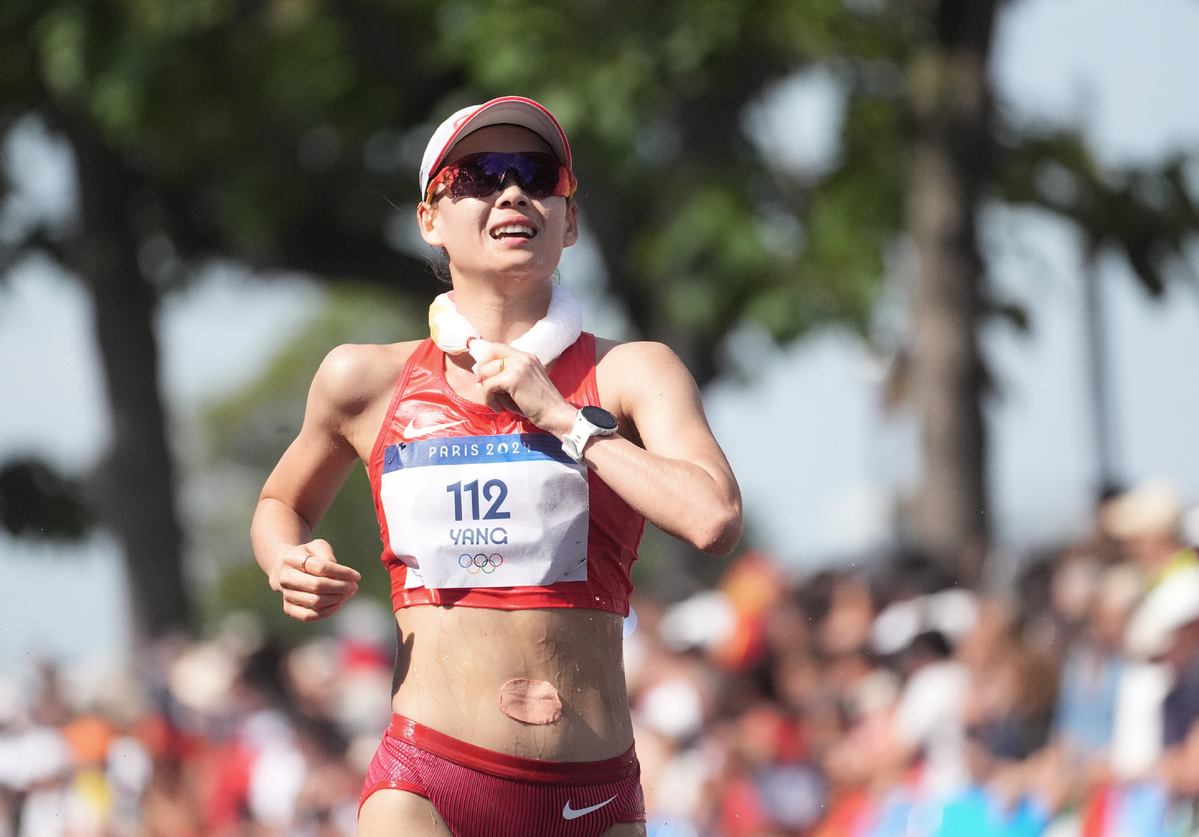
China's Yang Jiayu won the women's 20km race walk at the Paris Olympics on Thursday.

CHATEAUROUX - China's Liu Yukun bagged a gold medal in his Olympic debut after winning the men's 50m rifle 3 positions here on Thursday.
Qualified first with 594 points, the world record holder registered 463.6 points in the final.
This is the fourth shooting gold for China at the Paris Olympics. Sheng Lihao took an individual gold in men's 10m air rifle, two days after winning the first gold of Paris 2024 with his pair Huang Yuting in the mixed team event on Saturday. Xie Yu won men's 10m air pistol on Sunday.
In Paris, France, the venue of 2024 Summer Olympics, a fleet of Chinese-made brand-new pure electric convertible double-decker buses are gliding along the Seine, zipping through the Arc de Triomphe and pulling up in front of the Eiffel Tower. As the world’s first of such kind, these electric buses are a technological marvel, promising pollution-free, experience-rich rides.
Click the video to check it out.
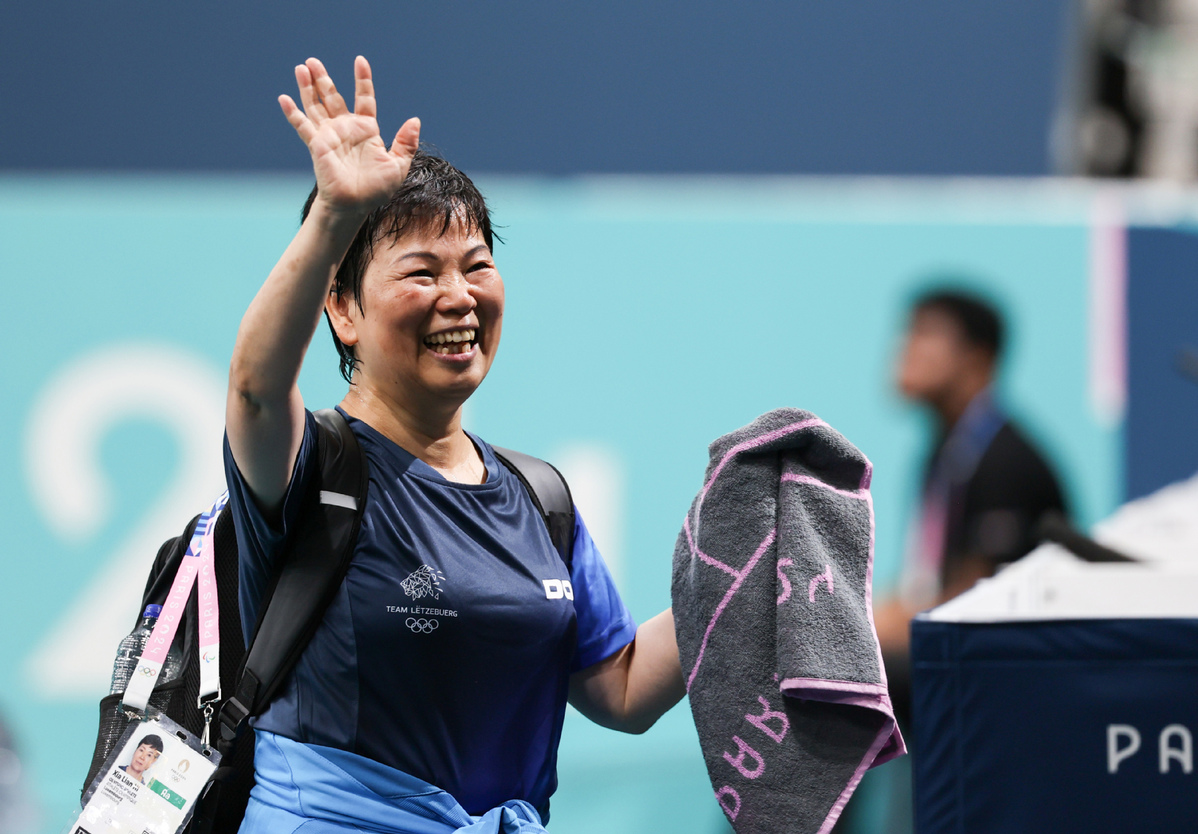
As an Olympic fan from a very young age, I have already got over my crush over any sporting "hero", because a "hero" maybe fickle and forgotten as time passes by. But this time in Paris I think I have come across one.
At the age of 61, Ni Xialian, the oldest table tennis player, never felt out of place in Paris.
With neat movements when taking advantage, and agile leaps to relieve her emotions when losing a point, the former Chinese world champion paddler, now representing Luxembourg, gave out her full strength against her much younger opponent from her home country—23-year-old Sun Yingsha, who, like Ni, did not conceal her skills to make it into the final 16 on Wednesday.
After wrapping up her sixth Olympic appearance with a lopsided defeat of 0-4 to the current world No 1, Ni emotionally acknowledged to the respectful crowd and said at the after-match interview that her dream had come true to play again at the Olympics and compete with the world's top player.
Before facing Sun at the opposite side of the table, "Aunt Ni" gave no destination when she was invited to serve as a training partner to China's eventual mixed doubles champions Sun Yingsha and Wang Chuqin before their face-off with a DPRK pair in the final game, due to the similarity of her technique to that of the DPRK's female player.
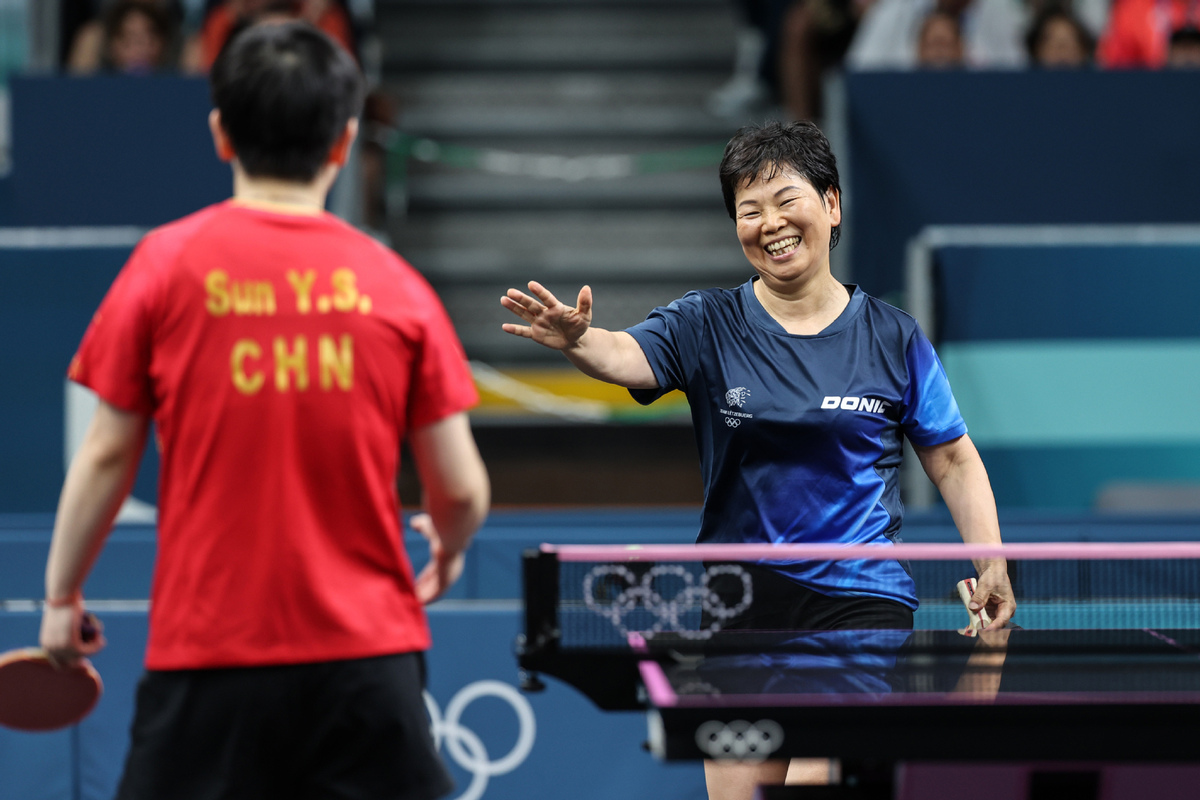
Throughout Sun and Ni's match, the CCTV commentators kept referring to Ni as "Master Ni" instead of using her full name to show respect for her contribution to China's table tennis at her career peak and also for her enduring efforts in promoting the sport in Europe and around the world.
I truly appreciate the shared slogan of the Paris Olympics and Paralympics "Games wide Open". To me, it means "wide open" not only for any competitor who embodies the Olympic spirit but also for any performance or choice made by an Olympian.
Not representing China though, Ni is still winning her home country's hearts and, I believe, will always be cherished by China and the sport because the Olympics and its fans are increasingly inclusive.
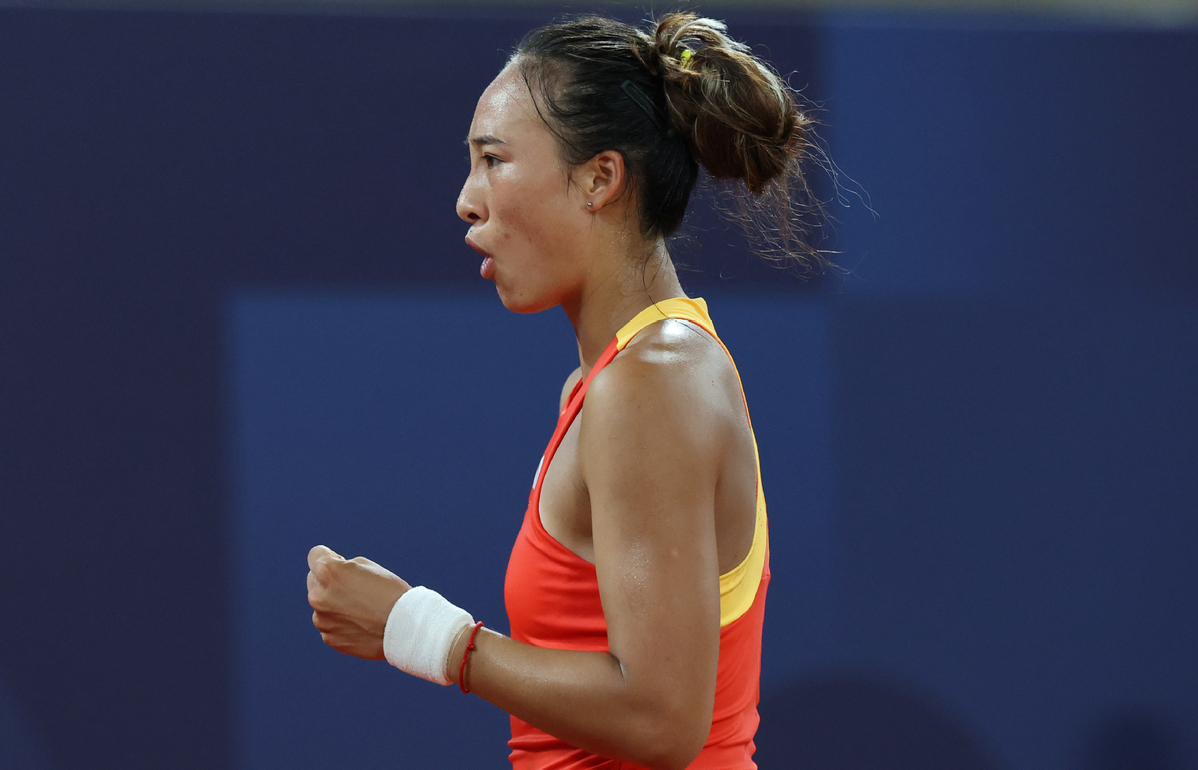
Chinese tennis star Zheng Qinwen made it to the Olympic women's singles semifinals on Wednesday in Paris, marking a significant achievement after a 16-year wait for China.
In a three-hour quarterfinal match at the Paris Olympics, Zheng, the 6th seed, defeated German veteran Angelique Kerber with a score of 6-7(4), 6-4, 7-6(6).
This victory extends her clay court winning streak to nine matches and makes her the second Chinese player to reach the Olympic women's singles semifinals, following Li Na's 2008 success.
"Today's match was incredibly tough. I knew I was under immense pressure, a pressure that undoubtedly surpassed my opponent's. I was acutely aware of what this victory means for China." Zheng said.
She started strong in the match, leading 5-3, but lost the first set in a tiebreak to the seasoned former world No. 1 Kerber, 4-7.
Facing adversity, Zheng unleashed her full potential, striving to turn the tide. In the second set, she significantly improved her focus on serve receiving and adjusted her tactics. While solidifying her own service games, she launched a series of offensive plays, leveling the match at 6-4.
In the decisive set, despite signs of fatigue from both players, their fighting spirit remained unyielding. Trailing 1-4, Zheng relied on her incisive attacks and tenacious will to keep herself in the game. With consecutive holds and breaks, she caught up to 4-4. After a 6-6 draw, they entered a tiebreak once more. This time, Zheng did not let victory slip away.
At the moment of triumph, Zheng was moved to tears, "I've broken through my own limits. When I secured this victory, my emotions were uncontrollable."
"I've always dreamed of winning a medal for China. Today, I gave my all, especially when I was 1-4 down in the final set. It was my mental strength that supported me. Seeing the national flag in the stands filled my heart with strength," she said.
"If this were a regular match, I might have lost. But this is the Olympics, the dream of all athletes, I'm grateful to have won today's match and still be standing on the court."
Zheng will face the world No 1 Iga Swiatek for a shot at the medals, who advanced to the women's singles semifinals due to her opponent's injury.
The semifinal will be a significant challenge for Zheng on her quest for an Olympic medal. She will face the formidable Polish powerhouse, who boasts a 23-match winning streak on clay and has defeated Zheng in all six of their previous encounters.
Additionally, in the mixed doubles quarterfinals, the temporary partners Wang Xinyu and Zhang Zhizhen achieved a comeback against the No 2 seeds, the Australian pair of John Peers and Storm Sanders, after saving two match points.
"Today's opponents were very strong. We were still looking for ways to deal with them in the first set. Although we lost the tiebreak, our receiving and response were very good, and this experience helped us to come back in the second set," Zhang said.
Wang and Zhang will face the Dutch pair of Demi Schuurs and Wesley Koolhof in the semifinal. Wang said that she thought it's best not to think too much and just execute the tactics. "Often, the more determined you are, the better it might be," she said.
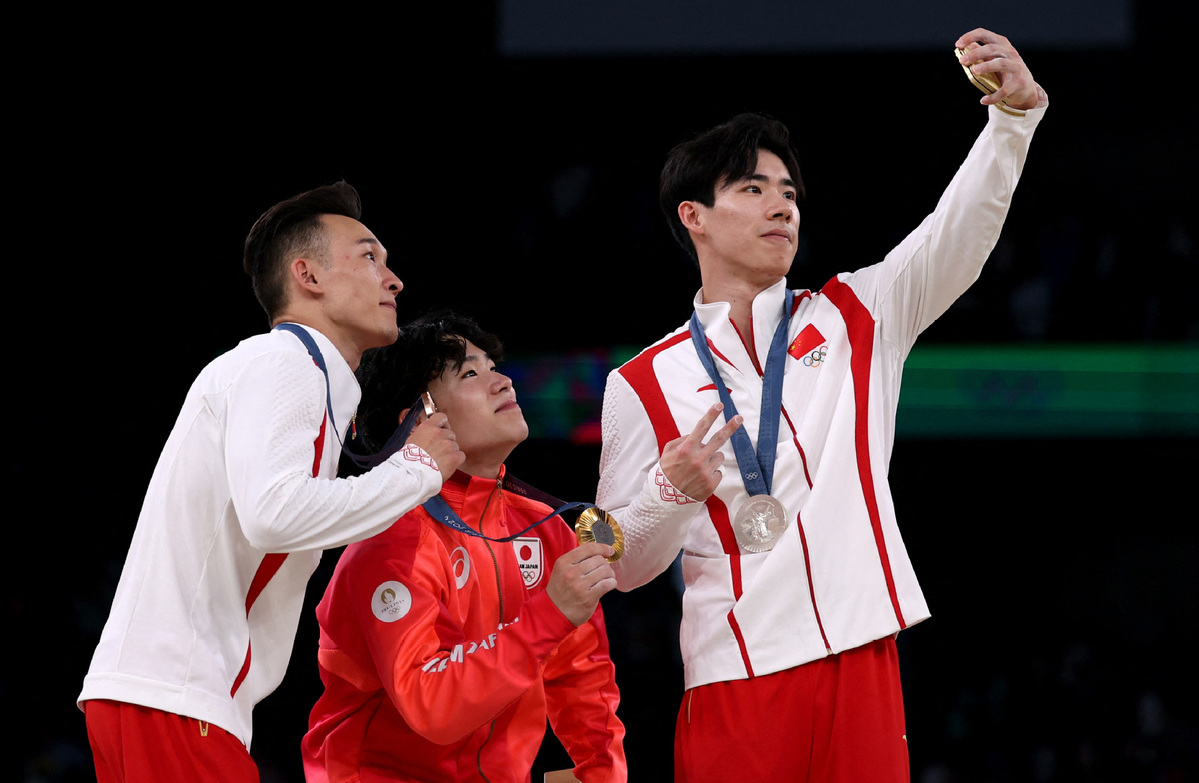
PARIS - Shinnosuke Oka of Japan is the new Olympic all-around champion.
Oka edged China's Zhang Boheng to win the men's individual all-around final and give Japan their second gold medal in gymnastics at Paris 2024 on Wednesday.
Japan now becomes the first country to take four straight all-around titles after Uchimura Kohei's 2012 and 2016 gold medals and Daiki Hashimoto's Tokyo win. Japan also won the men's team final two days ago.
"I'm very happy to have won two gold medals," said Oka. "But today we've seen a lot of gymnasts having mistakes. They weren't able to perform in their best form. If they were, and if everyone was in good condition, it would have been a better competition."
The 20-year-old performed consistently and led for most of the competition, scoring a total 86.832 points, 0.233 ahead of Zhang who took the silver medal. Zhang, the 2021 world all-around champion, now has two Olympics medals, included a team silver in Paris.
"Maybe I didn't stand on the highest podium," Zhang said. "But over these 24 years, I feel like I've been constantly overcoming myself. It hasn't been easy for me, and I didn't expect to perform so well on the horizontal bar in the end."
Xiao Ruoteng of China, the Tokyo all-around silver medalist, took the bronze with 86.364. It was his fifth Olympic medal overall after the team silver, together with one silver and two bronze medals from Tokyo 2020.
Hashimoto of Japan failed to defend his title and fell to sixth place. He came off the pommel horse, a repeat of his missteps in the team final, scoring a low 12.966 and at one point placed as low as 15th. He never quite recovered to be in contention for a medal.
Oka, a 2019 world junior champion, had won the NHK Trophy men's all-around title, Japan's Olympic trial event, but had few international appearances due to injuries. Hashimoto had not competed in the NHK competition.
Two years his senior, Hashimoto held Oka in a victory celebration after the results were announced, hinting that Japan now has a new gymnastics superstar.
Finally, on the final apparatus, all eyes were on Zhang as he flipped and turned on the high bar. With minor miscues, his solid score of 14.633 fell short of the 14.866 required to overtake Oka.
The 24-year-old went through an early scare and performed well on the rings and parallel bars to climb to third place before the high bar. His blip came in the first apparatus, the floor exercise, and he briefly placed as low as 16th.
Illia Kovtun of Ukraine surged into the lead after Rotation 4 with excellent pommel horse and parallel bars routines, but fell short on the high bar compared with other leading contenders, and ended up fourth.
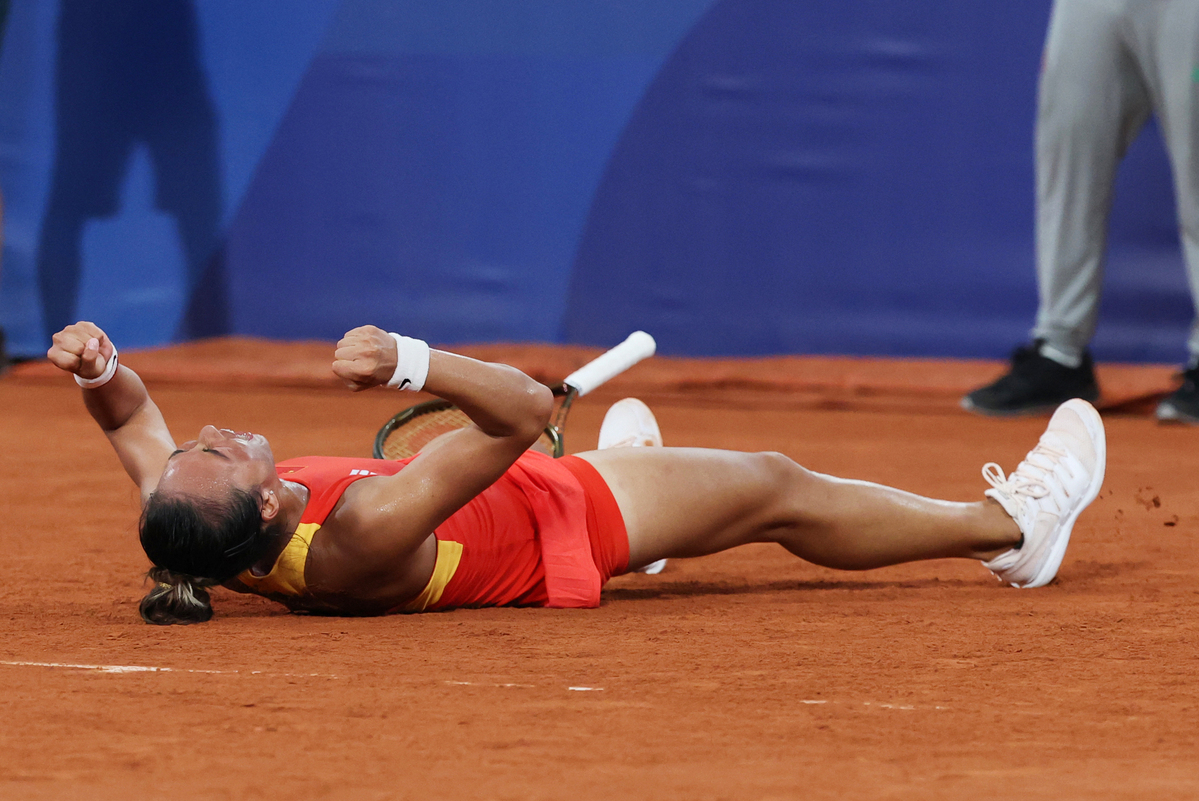
PARIS -- It was another hot day at Roland Garros as China's Zheng Qinwen gave China a shot at a medal after getting through her second three-hour match in two days, while Rafael Nadal perhaps waved goodbye to his second home.
China's medal hopeful fought hard to qualify for the semifinals against German veteran Angelique Kerber. In a marathon 6-7 (4), 6-4, 7-6 (6) victory on Court Philippe-Chatrier, Zheng, still recovering from an equally tough match the day before, struggled to find her rhythm, committing 49 unforced errors and being broken five times.
For Kerber, this match marked the end of a successful career in which the German won three Grand Slams and an Olympic silver medal.
The first set was a rollercoaster as both players frequently broke each other's serve, neither able to dominate. The match began poorly for China's No. 1 when Zheng was broken in the first game, committing numerous unforced errors and allowing Kerber to gain an early advantage.
It took time for Zheng to find her flow against Kerber, who had announced her retirement before the tournament. Zheng broke back in the sixth game, shifting the momentum in her favor briefly. However, Kerber dug deep to break Zheng again while serving for the set, then held her own serve convincingly.
With the momentum on her side, Kerber broke Zheng for the third time in the set. When serving for the set, Zheng fought back, breaking Kerber for the third time to force a tiebreak. In the tiebreak, momentum continued to shift, but Kerber exploited Zheng's weakness on her second serve to win 7-4.
The second set saw both players initially hold their serves until Zheng broke after a lengthy deuce battle. But Zheng couldn't capitalize, immediately getting broken back by Kerber. Both players then held their serves for four games until Zheng broke Kerber again in the ninth game. Serving for the set, Zheng held firm and secured the set.
With rain expected, the roof was closed for the decisive third set, focusing the crowd's attention. Zheng struggled to maintain her momentum, getting broken without scoring in the third game.
In the following game, Zheng fought hard to break back, but Kerber held her serve after a tough battle over eight break points. As the match neared its conclusion, Zheng broke Kerber again. Despite the pressure on their serves, both players held, taking the third set to a tiebreak.
The battle of attrition reached its climax just shy of the three-hour mark. Despite Kerber taking the first point, Zheng pulled ahead, but Kerber closed the 6-3 gap to 6-6 on Zheng's serve.
With the crowd behind the veteran, the pressure was on Zheng to dig deep. An intelligent drop shot put Zheng back on match point, and a missed return by Kerber on Zheng's serve finally gave the Chinese sixth seed the victory after more than three hours of grueling tennis.
"Today's match was entirely about mental strength because I knew my performance wasn't as good as usual. I was under a lot of pressure, knowing what this match meant for me and for China. I am really happy for myself for winning this match, and I'm also happy for my team," Zheng admitted after the match. "Fighting for two or three hours for two consecutive days really tested my physical endurance."
"I think there are a lot of emotions. You know I gave everything I could on court. And I think this is what counts for me," Kerber said following her retirement. "Personally, I think the biggest success which I made, withstood a three-hour battle, match points saved, crazy battle for every point. And one of the biggest stages is that a summary of your career to go out."
Zheng will face Iga Swiatek in the semifinals. World No. 1 Swiatek and four-time French Open winner advanced to the Olympic semifinals after Danielle Collins retired with an injury in the final set. Swiatek dominated the first set 6-1, but Collins leveled by winning the second set 6-2 before her injury.
In men's singles action, No. 1 seed Novak Djokovic of Serbia overcame a spirited defense from Germany's Dominik Koepfer to emerge victorious 7-5, 6-3.
The writing seemed to be on the wall for Koepfer when Djokovic broke his serve to take a 3-1 lead in the first set, but the German clearly hadn't read the script when he immediately broke back to level proceedings at 3-3.
However, as the match wore on in the searing heat at Roland Garros, Koepfer seemed unable to maintain Djokovic's level of performance and consistency, and four unforced errors in the decisive 12th game condemned him to a first-set defeat.
Thereafter, it was rather more straightforward for Djokovic, who broke Koepfer in Game 4 of the second set, and maintained his composure to win all his remaining service games, closing out the match in one hour, 37 minutes.
Elsewhere in the men's singles, No. 2 seed Carlos Alcaraz of Spain also saw off his opponent inside two sets, beating neutral athlete Roman Safiullin 6-4, 6-2 in one hour, 30 minutes.
Safiullin initially had no answer to Alcaraz's powerful ground strokes as the Spaniard broke his serve twice to race into a 3-0 lead. However, the Russian soon grew into the contest, and broke Alcaraz to love in the next game before holding serve to make the score 3-2.
The No. 2 seed would not be denied thereafter, however, holding serve for the remainder of the set to close things out inside 45 minutes. Alcaraz then started the second set as he meant to go on, breaking Safiullin's serve to love in the very first game.
Though Safiullin hit back with some convincing baseline strokes of his own, Alcaraz would not be denied, winning all his service games and breaking Safiullin in especially impressive fashion at 5-2, notching a couple of clinical backhand winners.
However, in the doubles, Alcaraz crashed out of the men's doubles with the King of Clay Rafael Nadal, spelling what could be Nadal's final appearance at the venue in which he won a record 14 French Open titles.
The pair lost to specialist American doubles pair of Austin Krajicek and Rajeev Ram 6-2, 6-4. The American duo, seeded fourth, dominated the match and advanced to the semifinals.
The loss ends Spain's hopes for a men's doubles medal, now relying on Alcaraz in singles and Sorribes/Bucsa in women's doubles. Despite their individual talents, Nadal and Alcaraz struggled with their lack of doubles experience and Alcaraz's physical fatigue from previous singles matches.
In the closest match of the day, China's mixed doubles team of Zhang Zhizhen and Wang Xinyu went to three tie-breaks as they defeated the Australian pair of Ellen Perez and Matthew Ebden 6-7 (8), 7-6 (8), 10-5. There was nothing to separate the Chinese and Australians, who fought hard over every single point in their more than two-hour match.
Felix Auger-Aliassime defeated fourth seed Daniil Medvedev 6-3, 7-6 (5) to reach the Olympic quarterfinals for the first time. The Canadian showcased sharp serving and effective net play to counter Medvedev's baseline tactics. Despite the straight-set win, the match was closely contested, with Auger-Aliassime clinching the crucial points in a tight tiebreak.
After a century, Olympic equestrian events have returned to their roots in Paris, set against the grand backdrop of the Chateau de Versailles. First introduced at the 1900 Paris Games, and revisited in 1924, these historic competitions once again take center stage in the City of Light.

The equestrian events kicked off on Saturday and drew large crowds, as riders and their equine partners competed under sunny skies. On Monday, Great Britain triumphed in the team eventing, while host nation France and Japan secured the silver and bronze medals. Germany's Michael Jung clinched the individual eventing title.
"I think that we are here in the most beautiful venue of the Olympic Games, in the Palace of Versailles," said Ingmar De Vos, president of the International Equestrian Federation. "I feel how different the equestrian events are in Paris, compared with any other games."
De Vos praised the infrastructure of the competition and said he was glad to see the global growth of equestrian sports.
"We have many more different nationalities competing than we did a hundred years ago. The horses are much better, and the athletes are much healthier. I think it's a completely different sport now. It's very technical," he said.
According to De Vos, Sunday's cross-country competition attracted an impressive 45,000 spectators, filling the stands to capacity. "The IOC told me that the equestrian events are among the most in-demand among visitors from all over the world, so we are very happy," he said.
"My main hope is that we have happy, healthy horses and safe athletes, and that they all enjoy the Games," De Vos said. "For many of them, it's a once-in-a-lifetime opportunity, so I really hope that they enjoy it. This is the best way to promote themselves, to promote their sport and to promote the horses."
The Olympic Games offer a unique opportunity to watch a wide variety of sports and witness a global community of top athletes coming together to celebrate the Olympic spirit and values, he said.
Alex Hua Tian fully experienced the crowd's enthusiasm, remarking that the Paris Games symbolize the homecoming of equestrian sports.
"For the three previous Olympics that I've competed in Beijing, Rio and Tokyo, the equestrian sports have been a little bit exotic. It's a new sport for people in those places. It's still developing and still growing."
"Whereas coming here, with the crowds at the cross-country and in the show jumping arena, it really gives you and the horse a very special feeling, let alone the surroundings of the Palace of Versailles. I'll never forget this moment."
Hua concluded his fourth Olympics with a 23rd-place finish in individual eventing, falling short of his best result of eighth place in Rio.
Hua and his horse were in a joint bronze medal position on a score of 22 after the first competition day, and they were excited for the cross-country stage. However, Hua faced a controversial setback during his run — his horse Chocs brushed against a flag, resulting in a 15-point penalty.
"We had a little incident where Chocs was distracted by one of the jump judges who was wandering around on the jumping line, and we hit the flag," Hua explained.
Hua lodged a formal appeal, but the jury upheld the ruling. "I have to accept it," Hua stated.
Other penalties in the cross-country, and the earlier dressage stage, amounting to 42.6 points, saw Hua's ranking plummet from 3rd to 32nd. With the podium well out of reach, the pressure eased for Hua, and he was able to enjoy the last competition day and just had fun.
While Hua was disappointed, he was proud of his horse. "He could not have tried any harder. He's such a talented horse. He is a total dream for anyone to bring here," he said.
De Vos thought that, without the mistake on the fence during the cross-country phase, Hua would have stood a very good chance of a podium finish.
"He was a bit unlucky yesterday, but it shows that there is the potential and that's really important for the country. It's really important to have an Olympic dream and to have a chance to gain medals," De Vos said.
With a growing number of international events being held in China, such as the Longines FEI Jumping World Cup next year, De Vos thinks that China is certainly a rising force in equestrian sports.
"I think they should continue to work hard for the future, and, with all the development of the sport in China, as well as the support from the government, medals are a real possibility in the future."
"We are also helping with the education of equestrians. There is a lot of work to be done, and we are working together with the federation to make that happen."
For Hua, he has not decided whether to take part in the National Games or the Asian Championships in Thailand next year, but one thing for sure is that he will continue to practice the sport he loves.
"There's no end in sight at the moment. I love what I do. As long as my body is happy for me to keep doing it, I will keep doing it," Hua said.
Contact the writers at liyingxue@chinadaily.com.cn
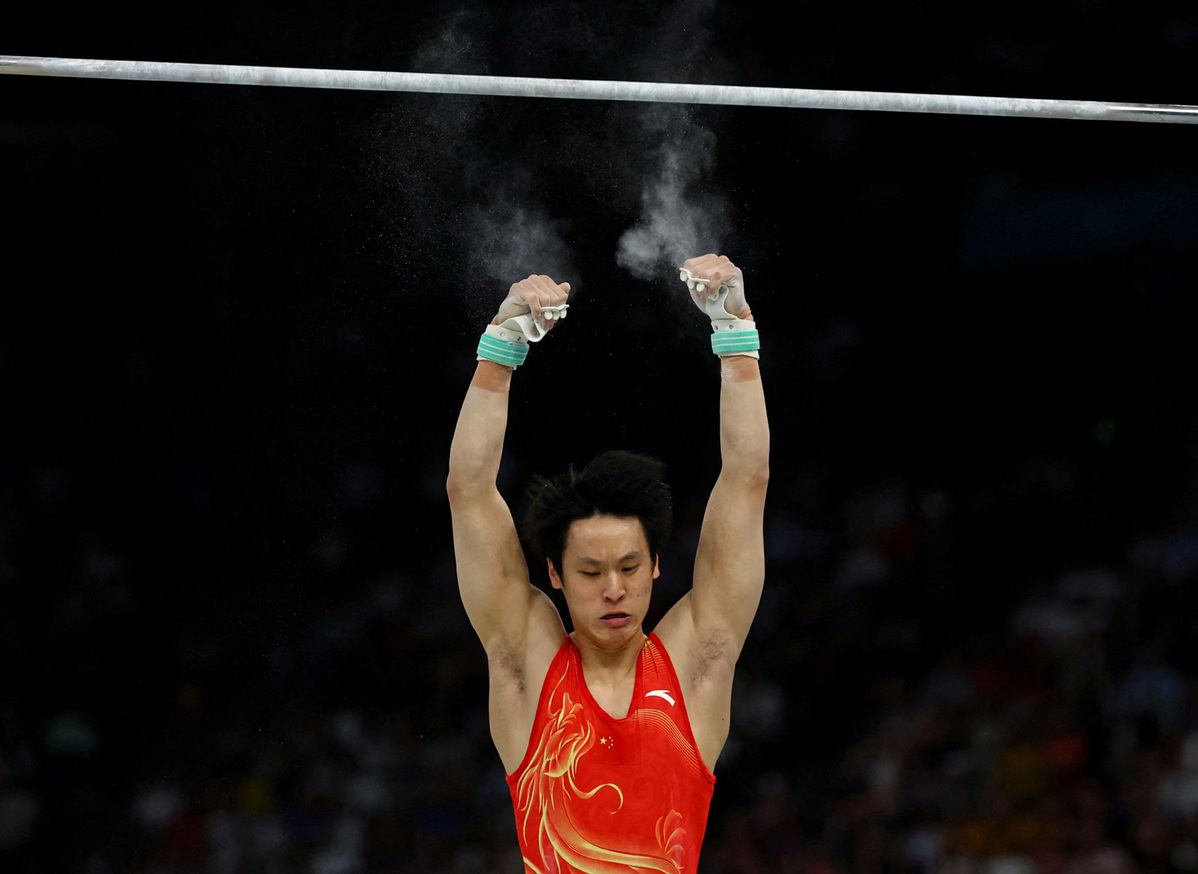
Along with records broken and medals celebrated, competing at the Olympics is more often littered with narrow defeats, last-gasp errors and mental meltdowns that build true character and sportsmanship.
Chinese athletes, as much as they strive to win, have had to learn the hard way, and perhaps the only way, in Paris that it's not just about wins and losses, but more about wins and lessons, as they draw strength from setbacks to come back stronger at the next try.
The Chinese men's gymnastics squad was the latest to fall foul of the suffocating mental grind on the Olympic stage, after an error-laden performance on the last apparatus in Monday's team final cost it dearly in its quest for gold.
After completing the first five events with almost flawless routines, the Chinese squad seemed almost certain to regain the men's team Olympic gold medal, entering the sixth and last apparatus, the horizontal bar, with a commanding 3.267-point lead over Japan.
Yet, with plenty of room for error, two of three Chinese gymnasts crumbled under the intense pressure of "almost there" — first veteran Xiao Ruoteng landing on his knees, followed by young substitute Su Weide falling twice off the bar. The sudden errors, that drew deep sighs across the Bercy Arena, threw Team China out of the driver's seat in a blink of an eye, allowing archrival Japan to come back in the last minute and secure the coveted team title.
The wild Japanese celebration soon took over the southern Paris arena, leaving Team China ruing the wasted effort of the first two hours and 15 minutes of the final, and the past three years of preparation, through tears of silver.
"It was a big and tough lesson learned for me today. I feel so bad that I failed my teammates, wasting the whole team's hard work and sacrifice," Su, who replaced injured teammate Sun Wei before the Games, said remorsefully at the post-final news conference.
"I am really struggling inside now, I can't think about my next step or how to improve from this yet."
Perhaps for Su, and any other Olympic debutant, there's no way that the strength needed to withstand such a brutal mental blow can be developed in training, but only forged by failure on the biggest stage.
In a similar fashion, in Tokyo three years ago, it was Japan that fell to Russia's extraordinary execution in the final rotation, losing the team gold by the narrowest margin in Olympic history — 0.103 points — at its home Games.
"We have to move on, though. We should leave this behind and focus on preparing for the individual events," said veteran Liu Yang, who will defend his men's rings gold medal on Sunday.
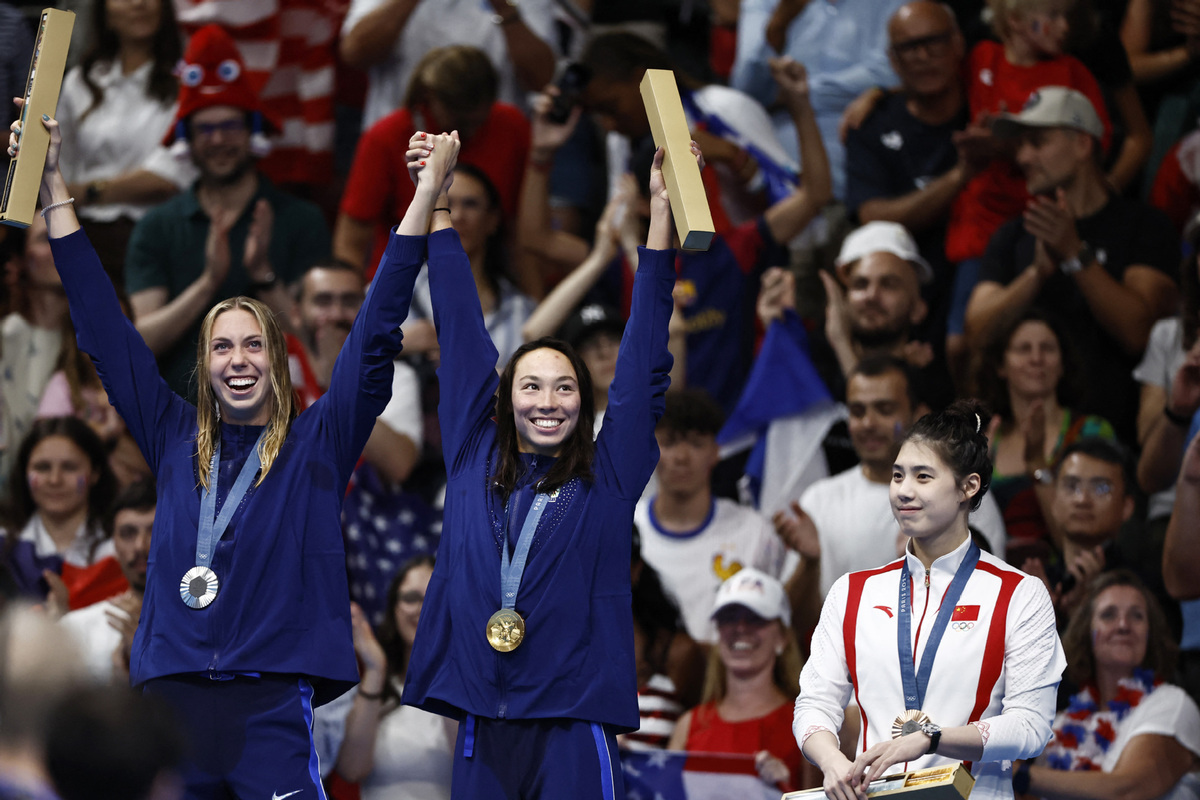
Hot water in the pool
Joining the men's gymnasts in suffering similar Olympic ordeals this year are some of China's best swimmers, namely defending Olympic champion Zhang Yufei and three-time world champion Qin Haiyang, who both missed out on gold in their first respective final sessions in Paris.
After being beaten to silver by just 0.05 seconds three years ago in Tokyo, Zhang had to come to terms with a second narrow defeat in an Olympic 100m butterfly final, won by Torri Huske of the United States on Sunday, after having tried so hard and proved what was possible with a world championships title last year.
Huske's compatriot and world record holder Gretchen Walsh won silver in 100m.
The challenges Zhang has dealt with, other than her surging opponents in the pool, involved repeated doping tests — as many as four times a day prior to the Games — which had apparently thrown her off her regular pace and routine.
In the lead-up to Paris, some Western media organizations published sensationalized reports about a proven food contamination incident in early 2021 that involved 23 Chinese swimmers, including Zhang.
The groundless allegations resulted in a high-frequency testing program targeting Chinese swimmers, despite the fact they had all been cleared of any wrongdoing by several investigations and reviews by international authorities, severely disrupting their final preparations en route to Paris.
Zhang, however, refused to make any excuses, only vowed to regroup and refocus on defending her 200m title, and perhaps, try the 100m a third time at the next Games in 2028.
"I just hope I can have another chance, after I readjust myself and improve my level, to compete against these two great rivals again to the best of my ability," said Zhang, who will also compete in the women's 50m freestyle in Paris.
As composed and positive as Zhang appeared after the race on Sunday, the Chinese star couldn't hold back her emotions at last, weeping while waving to fans applauding her from the stands, showing a glimpse of the huge pressure on her shoulders in the buildup to the Paris Games.
Zhang had expressed concerns about the doping allegations in an earlier interview, stating that the irresponsible accusations could have soured her relationship with some of her competitors, potentially turning healthy competition into hostility.
This explained why she smiled so brightly, apparently with a sense of relief, after both Huske and Walsh invited Zhang to share the top step of the podium to take group photos together.
"It was kind of heart-warming that they did embrace me on the podium," said a smiling Zhang at the post-final news conference.
"Hopefully, I can have the chance to participate in the next Olympic Games in Los Angeles in 2028," she said.
For three-time men's breaststroke world champion Qin, his main takeaway from a disappointing 100m final, where he fell from hitting the turn first to an eventual seventh place finish, was to keep improving his mental game.
Qin, the 2023 world champion and world record holder in the 200m breaststroke, and considered one of the favorites for gold, failed to qualify for the final with a time of 2 min 09.96 sec in his semifinal, 1.85sec behind the fastest qualifier Leon Marchand of France.
"I was solid in training, but I don't know what went wrong today. My first 50m was as fast as expected, but somehow I messed up with my pace in the second split. I feel like I wasn't mentally focused enough to pull it off," said Qin after the final.
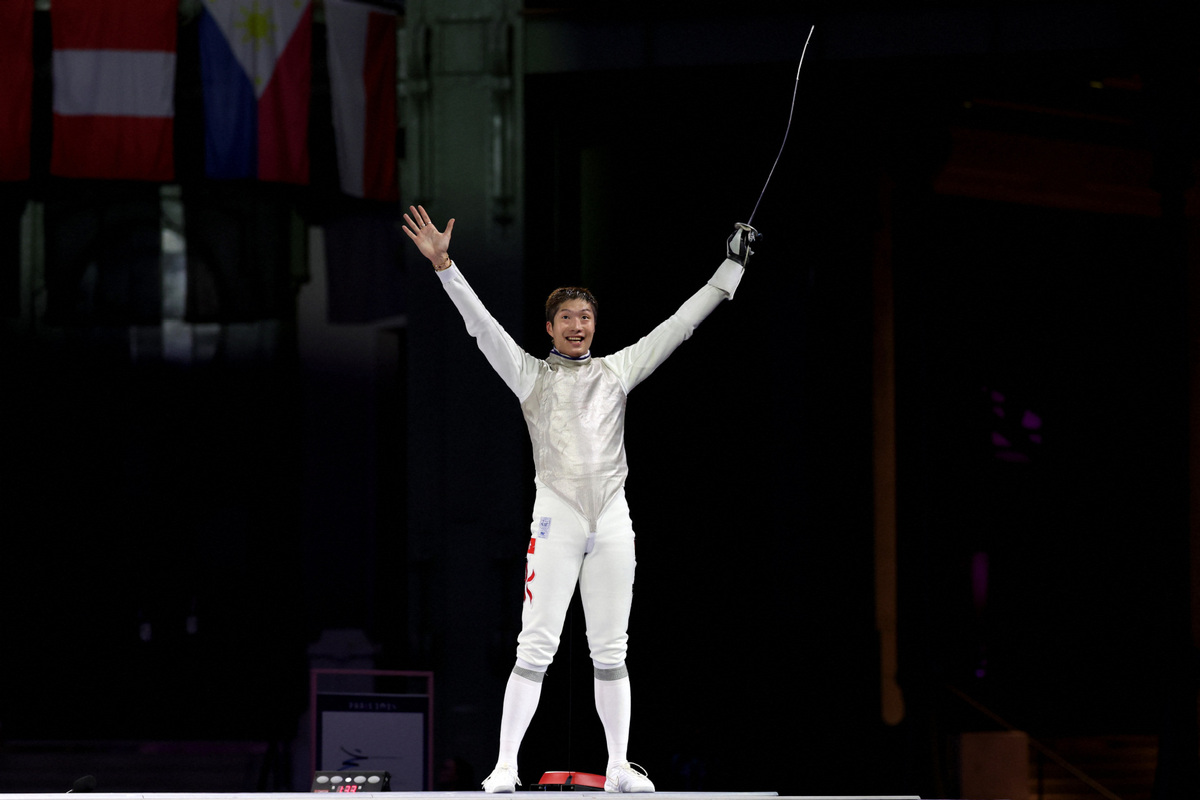
Two years ago, in a quandary following his gold medal win in the men's individual foil at the Tokyo Olympics in 2021, Edgar Cheung Ka-long watched Michael Jordan's documentary The Last Dance for a second time to learn how the legendary basketball player sustained his drive.
"The conventional path to win a championship involves striving for a very long time, but I achieved this goal relatively early, so what should I strive for next?" the Hong Kong champion fencer told local media at the time.
Ultimately, he discovered the answer — to continue winning. Two years later, at the Paris Olympics, 27-year-old Cheung successfully defended his men's foil individual title on Monday.
This gold medal is the second for the Hong Kong, China team at this year's Olympiad. It also distinguishes Cheung as the first athlete in Hong Kong's history to successfully defend an Olympic gold medal, and the first to secure two. Also, as the last instance of a fencer successfully defending the Olympic men's foil title dates back to 1956, this medal made Cheung the first athlete in 68 years to achieve such a feat.
Following Cheung's victory, his French coach, Gregory Koenig, highlighted the additional significance of the gold medal: it symbolizes the journey of how a young boy evolved into a mature hero.
"Three years ago, he (Cheung) was a fearless boy. Today, he has transformed into a man," Koenig said.
Koenig recalled vivid memories of Cheung's state of mind before the Tokyo Olympics.
At the time, when confronted with defeat, Cheung would experience moments of self-doubt. He visited Koenig's home, confiding that he felt a loss of joy in fencing, unsure of how to proceed, and questioning if he was suitable for the sport.
But, Koenig was convinced of Cheung's ability. Employing various methods, the coach supported Cheung. He encouraged and assured him that everything was well-prepared, he just needed "a good mindset". He even granted Cheung a weeklong break at a critical juncture to help him sort out his emotions. Cheung later described this break as having "saved his life".
With a revitalized attitude, Cheung emerged victorious. On the evening of July 26, 2021, at the Tokyo Olympics, he bested Daniele Garozzo, the Italian fencer who had previously secured the men's individual title at the Rio Olympics, with a score of 15-11.
The gold medal marked a significant moment in Hong Kong's history, becoming its second Olympic gold in 25 years, following the region's first Olympic triumph, in sailboarding, at Atlanta 1996.Beyond the sporting realm, the victory also acted as a morale booster for the city, lifting its spirits during a somber period following social unrest and the challenges posed by the COVID-19 pandemic.
A new term had even emerged in Hong Kong — the "Ka-long Effect".
Cheung became a household name among the city's 7 million residents. Advertisements featuring him adorned the streets. One of his alma maters named a classroom after him, making him the third alumnus to receive such recognition. Numerous fencing schools sprang up, and hordes of young people regarded Cheung as a spiritual beacon.
According to local media reports, Cheung took time to process the sudden change.
Initially, he found it hard to accept. "I couldn't believe that I was an Olympic champion; I was bewildered by the situation."
Subsequently, he gradually embraced his new identity. He acquired the ability to decline public appearances that didn't resonate with him, select endorsements judiciously, and graciously interact with fans who asked to take photos together.
But, more importantly, Cheung understood how to discern what truly matters amidst various temptations and voices — his passion for fencing.
Cheung's family background is rooted in basketball, as both his father and mother were professional basketball players. Initially, his family encouraged him to pursue basketball, but Cheung's passion for fencing blossomed when he began learning the sport at the age of 10. During middle school, Cheung wanted to become a full-time fencer, which was opposed by his family. Cheung didn't give up. He spent a year persuading his family, and eventually they backed down.
It was that passion for fencing that propelled Cheung to continue after his Tokyo success. Over the next three years, Cheung won many competitions, including the Asian Games in Hangzhou in 2023, the 2024 Grand Prix in Turin, Italy, in February, and another Grand Prix in Shanghai in May.
Throughout this period, Cheung also honed his ability to cope with failure.
In the lead-up to the Paris Olympics, Cheung faced setbacks similar to those preceding the Tokyo Olympics. June's 2024 Asian Fencing Championships in Kuwait concluded with him exiting the individual competition in the round of 16 and finishing the team competition in fourth place.
However, compared to previous years, Cheung approached these challenges with greater resilience. Cheung acknowledged that the defeat was a "hit" for him, yet it served as a reminder that he should "give his all in every match and approach each fencing bout with determination".
In a June interview talking about his preparations for the Paris Olympics, he stated calmly, "I am not overly concerned about defending the title. My focus is on performing at my best without placing excessive pressure on myself.
"When I was young, I was really emotional, but as I grew older, I learned to recognize and adjust to this aspect, perhaps due to gaining more experience, or perhaps, I just grew up."
On Monday, during the final of men's foil at the Paris Olympics, Cheung faced off against the Italian fencer, Filippo Macchi. The competition saw Cheung trailing 12-14, before leveling the score to 14-all. In three decisive moments, Cheung clashed with his opponent and won the crucial point, ultimately securing victory with a score of 15:14.
Koenig said Cheung's exceptional mental fortitude was a pivotal factor in his gold medal win, adding, "You can't believe how strong his heart is."
What's more, after this victory, Cheung is not as bewildered as he was after his win in Tokyo. Facing the media, he affirmed his determination to secure another World Championship title. "I will persist in my efforts to create more milestones in my professional journey, with my next aim set on achieving the Grand Slam."
